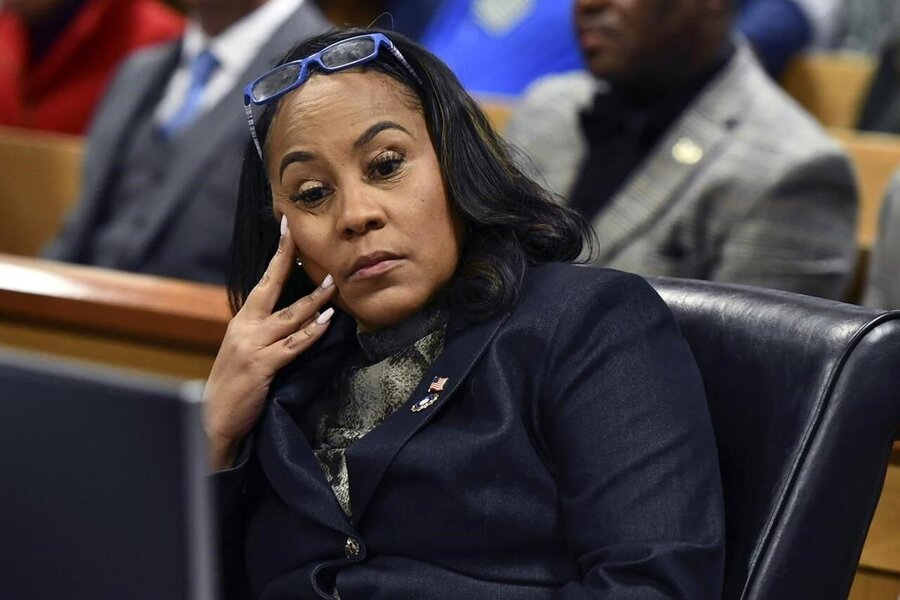On Monday, lawyers for former President Donald Trump filed a motion with the Georgia Court of Appeals seeking the removal of Fulton County District Attorney Fani Willis from the case. They argue that Willis has committed a “severe violation” of the state’s legal standards.
In a reply brief, the former president’s team wrote that Trump was “aggrieved by Willis’ church speech,” referring to comments she made in January that suggested there was a racial animus at play when a co-defendant filed a motion to have her disqualified over a relationship she had with her then-special prosecutor.
The legal team argued that her speech was “a severe violation of the Georgia Rules of Professional Conduct.”
They claimed that her remarks at the church were intended to sway public opinion against Trump and the other co-defendants, potentially influencing future jurors. Based on this argument, they believe Willis should be removed from the case.
“Pretermitting fairness, President Trump was injured by Willis’ … speech because national and local media outlets broadcast and reported Willis’ claim as an attack against the defense,” the filing said.
Willis, it added, also asserted that “allegations against her stemmed from racism,” which his legal team said were unfounded.
The Georgia appeals court has scheduled a hearing for December 5 to consider an appeal by Trump and several co-defendants. The appeal challenges whether Willis should be disqualified from the case because of her connection with former special prosecutor Nathan Wade.
Earlier this year, Fulton County Superior Court Judge Scott McAfee decided that either Wade or Willis needed to be removed from the case. Wade stepped down, allowing Willis to remain. Trump and the other defendants swiftly moved to appeal the decision.
In his March ruling, McAfee criticized Willis for her church speech but ruled that it did not justify her disqualification. He also noted that there was insufficient evidence to remove her based on her relationship with Wade. However, he did suggest that the case carried an “odor of mendacity.”
Fulton County prosecutors had said that her speech at the church was vague, and she was not speaking about anyone in particular.
“Isn’t it them who’s playing the race card when they only question one?” Willis said during her speech, in part. “Isn’t it them playing the race card when they constantly think I need someone from some other jurisdiction in some other state to tell me how to do a job I’ve been doing almost 30 years?”
In August, her office filed a motion to dismiss the appeal, contending that there was insufficient evidence to support claims of a conflict of interest stemming from her previous relationship with Wade.
“Unsatisfied, the Appellants now seize upon the trial court’s criticisms of the District Attorney to distort its actual findings and overstate their case,” the district attorney’s office wrote.
“They ask this Court to second guess the trial court’s factual conclusions and apply standards of disqualification that no Georgia court has ever authorized or employed.”
The dispute began in January when co-defendant Michael Roman, a former Trump campaign aide, alleged in court documents that Willis and Wade were involved in a relationship. This claim was later confirmed by both parties during a heated hearing before McAfee in February.
However, they disputed several key allegations made by Roman and his co-defendants’ lawyers, including claims that they financially benefited from their relationship. They also rejected claims from a witness who suggested that their relationship began earlier than they had said.
The case was brought by Willis against Trump and more than a dozen other co-defendants, accusing them of conspiring to overturn the election results in the county after the 2020 election.
In part, her office’s indictment focused on a Trump phone call in January 2021 with Georgia Secretary of State Brad Raffensperger in which the president asked him about votes and ballots.
Trump and the majority of the other co-defendants, including former New York City Mayor Rudy Giuliani, have pleaded not guilty, although several have entered guilty pleas as part of deals with the prosecution.
Due to the appeals process, the case likely will not proceed to trial before the November election.
Share your thoughts by scrolling down to leave a comment.













